Why Are Most Tamales Made With Pork Instead of Beef
Authentic Red Tamales with an extra delicious, shredded meat filling, that taste better than anything you can get at a restaurant. Tamales are an ultimate dish craved around the world!
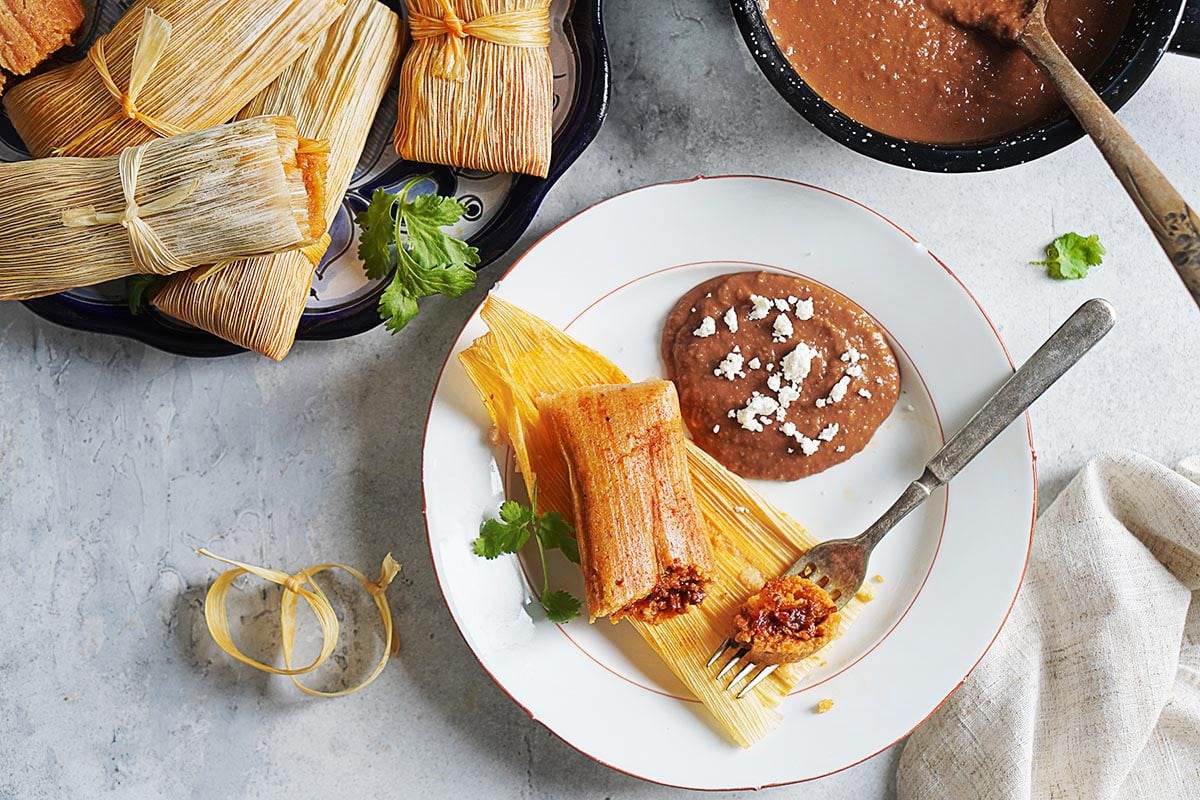
This is THE BEST Tamales recipe that's wildly popular every December! But they're irresistible all year long.
I'm going to show you how to make them like a pro! It's easier than you think when when you use a stand mixer and you prepare a few things ahead of time. But I'm not going to lie to you, it's a bit time consuming but the results are sooo worth it!
Read my step by step tutorial, time saving tricks, tips and more. Don't forget to check out the "Make Ahead" section.
You got this!
Kneading the masa the traditional way: the heavy work is kneading the masa just right since it's done by hand. Mixing the lard and the masa to the right consistency takes a lot of time and lots of elbow grease! But in this recipe, we'll use a stand mixer to cut a lot of that intense labor.
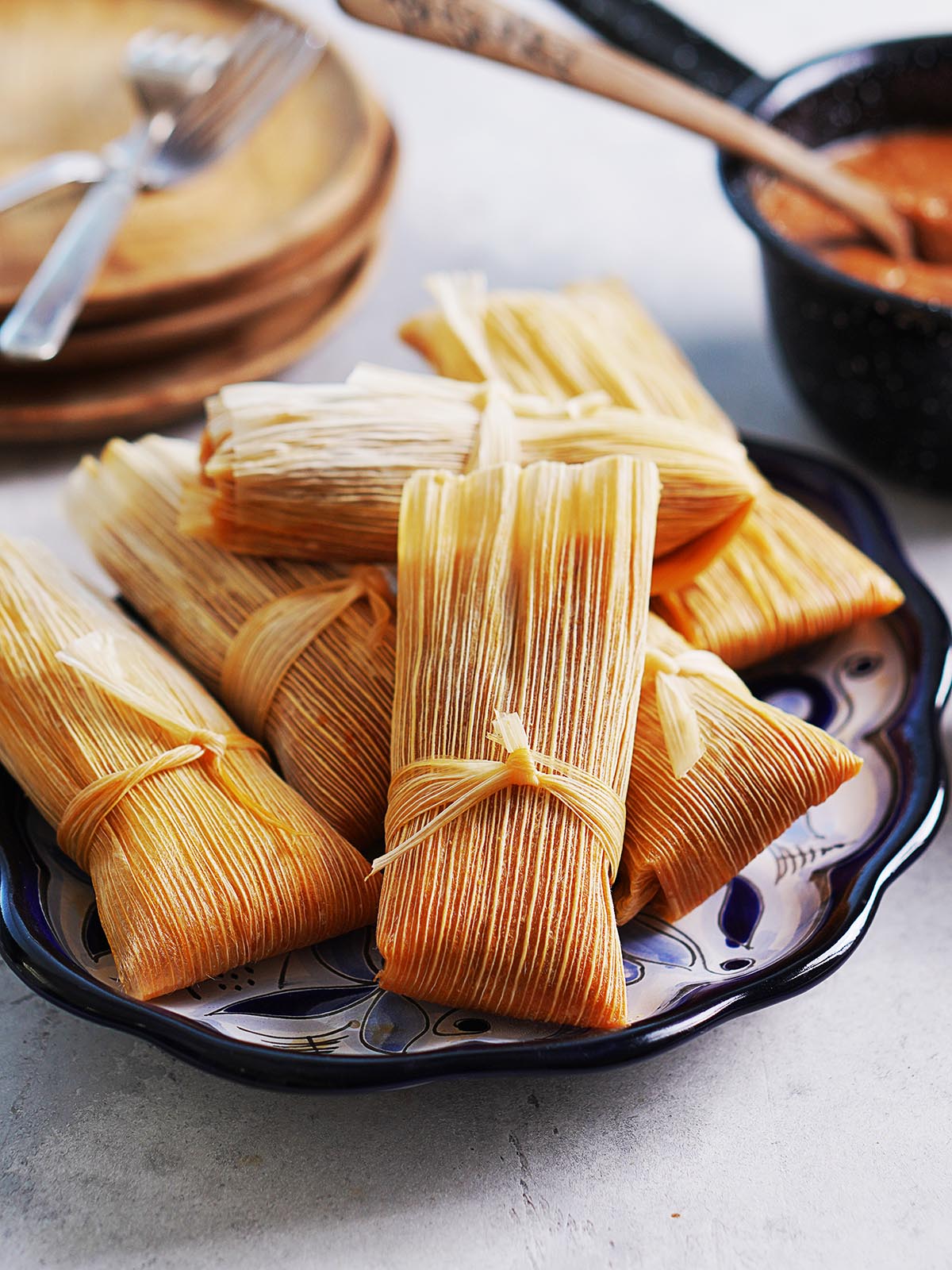
Tamales Ingredients
Here's what goes in my Red Tamales with a few notes:
- Shredded Meat – for these tamales I'm using shredded beef but it can be substituted with pork, chicken or turkey. You can also make a vegan tamale using jackfruit!
- The Red Sauce – I use this red sauce but even this guajillo salsa would work wonderfully.
- The Masa – I'm using pre-made bought at the store but you can also make the masa using Maseca. Here is a recipe on how to make masa for tamales with maseca
- Broth – If you cook meat for your tamales, use that broth. Otherwise use from a box.
- Vegetable Shortening – normally tamales are made with pork lard but I prefer to use a vegetable shortening such as Morrell Snow Cap Lard. You can also use a mild flavor oil but I find that the tamales texture won't come out the same.
- The Salt – for this recipe we'll use table salt (vs kosher salt) as it integrates better in the masa since it's finer.
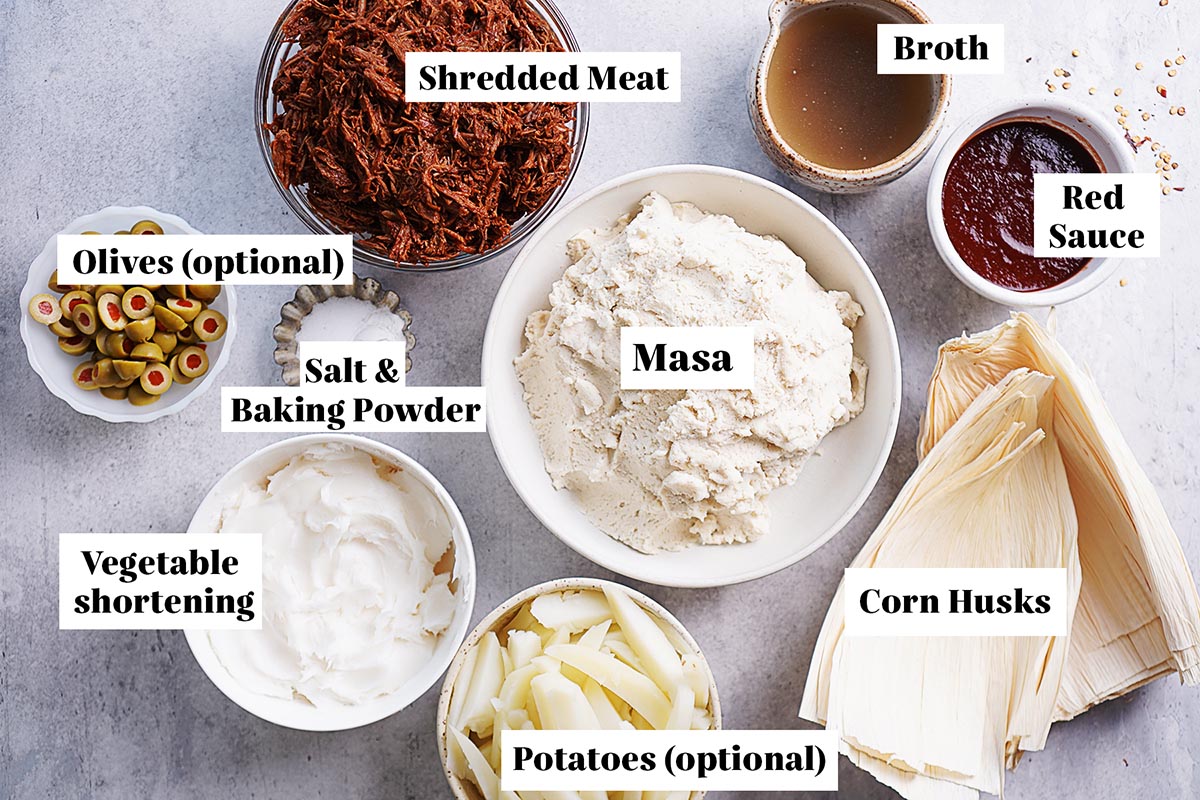
How to make Tamales
This recipe is for a small batch of tamales. It makes about 24 large ones but you can easily half the recipe to make 12. It can also be doubled or tripled to make as many as you want!
For this method, we're using a stand mixer but you could also use a high power hand mixer.
Cook the Meat the day before: See recipe card for exact instructions and ingredients but basically you'll be boiling the beef (or your preferred meat) with onions, garlic and celery plus some spices. Then it'll be shredded.
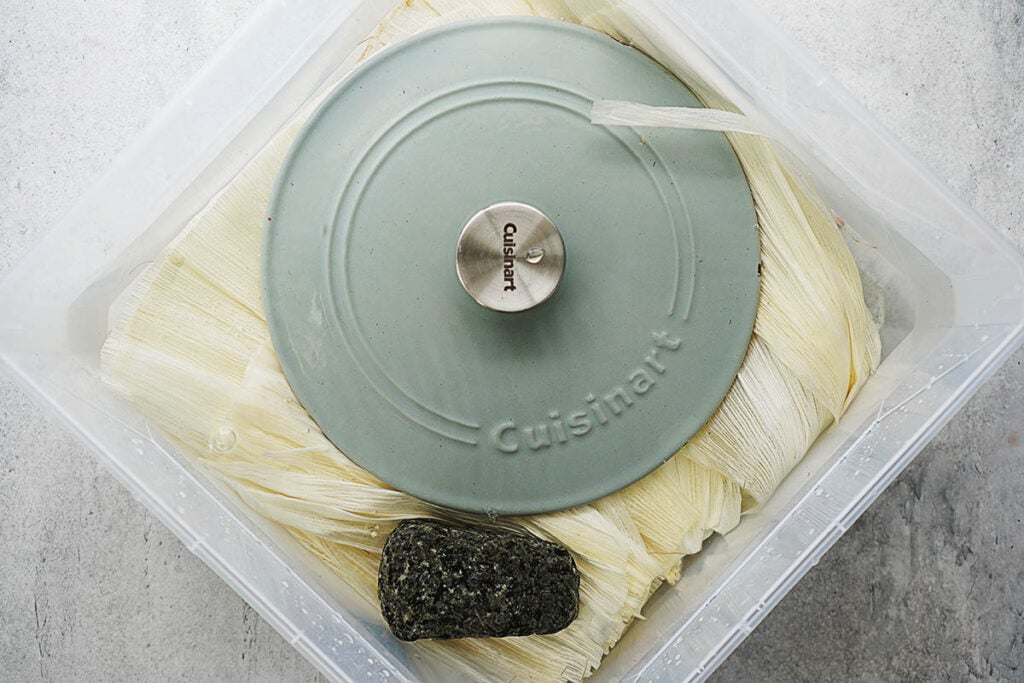
Soak The Husks: Place the corn husks in a large container or bowl and cover with warm water. Place something heavy on top of the husks in order to keep them submerged. Soak for at least 20 minutes to soften them up.
- In a mixing cup, add the broth and red sauce and combine.
- In the bowl of a stand mixer fitted with a paddle attachment, add the shortening, salt, and baking powder.
- Mix on medium/low power until it's light and fluffy. About 8 to 10 minutes. Scrape down the sides of the bowl with a spatula to mix the ingredients on the sides.
Alternate wet and dry ingredients:
- With the mixer still running, add some of the masa (the size of a tennis ball) and mix.
- Then add some of the sauce and mix.
- Repeat until all the masa and sauce are fully incorporated and have a smooth & silky batter.
- To test when the masa is ready, add a dollop of it in a glass with cold water: if it floats, then it's ready!!! This is the old traditional way of knowing when the masa is ready 😉
Note: What if the masa doesn't float? Just continue kneading the masa for a few more minutes. This will make it more fluffy and eventually will float.
To assemble
Get all of your ingredients lined up and ready for assembly.
Tip: If you have a group of people helping out, create an assembly line. Each person can do a specific task!
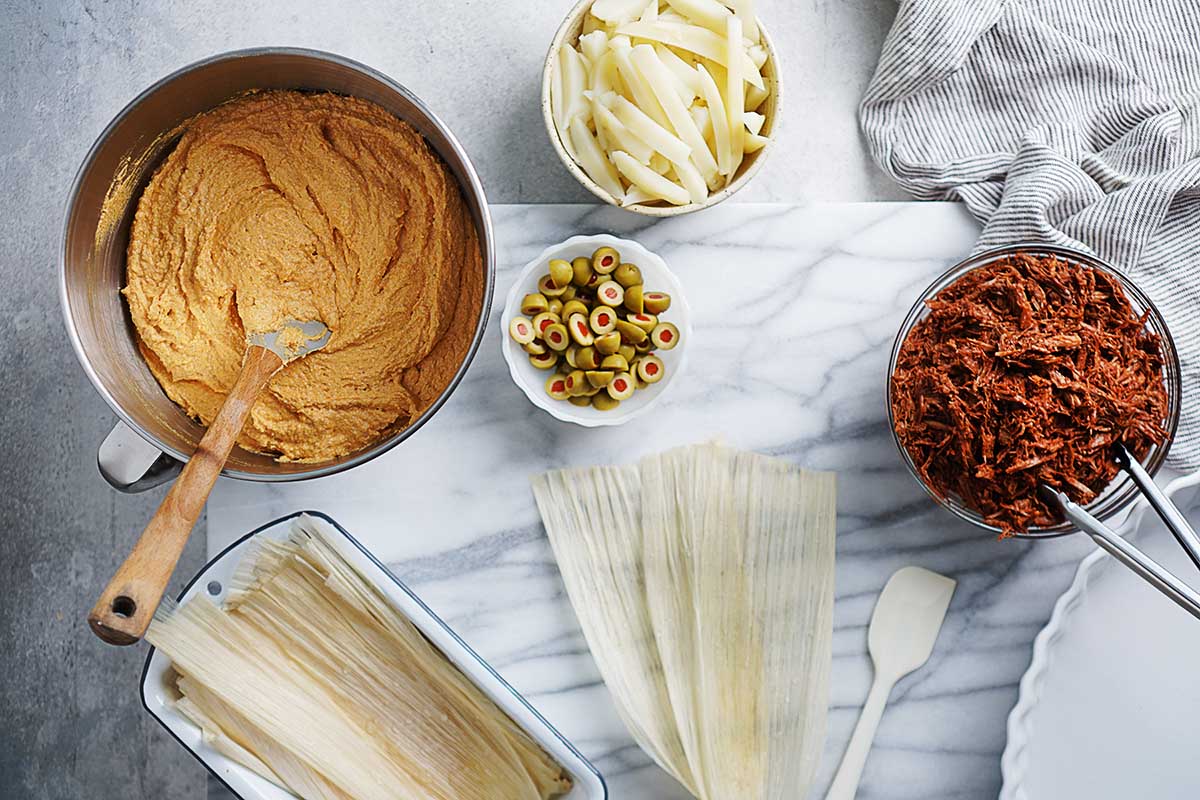
Scoop about a 1/4 cup masa into one large or two overlapping smaller husks and smear it with a small spatula or back of a spoon. Add about 2 to 3 tablespoons of shredded meat, 1 potato slice & olives (optional).
Fold one side of the husk to enclose then the other side on top of it.
How to tie
- Fold up the bottom to the top (the narrow end), leaving the top open. Then tie with a string made from the husk.
- Option 2 is to fill the tamal in the middle and tie both ends with husk string. This is a little more time consuming but they look so cute!
-
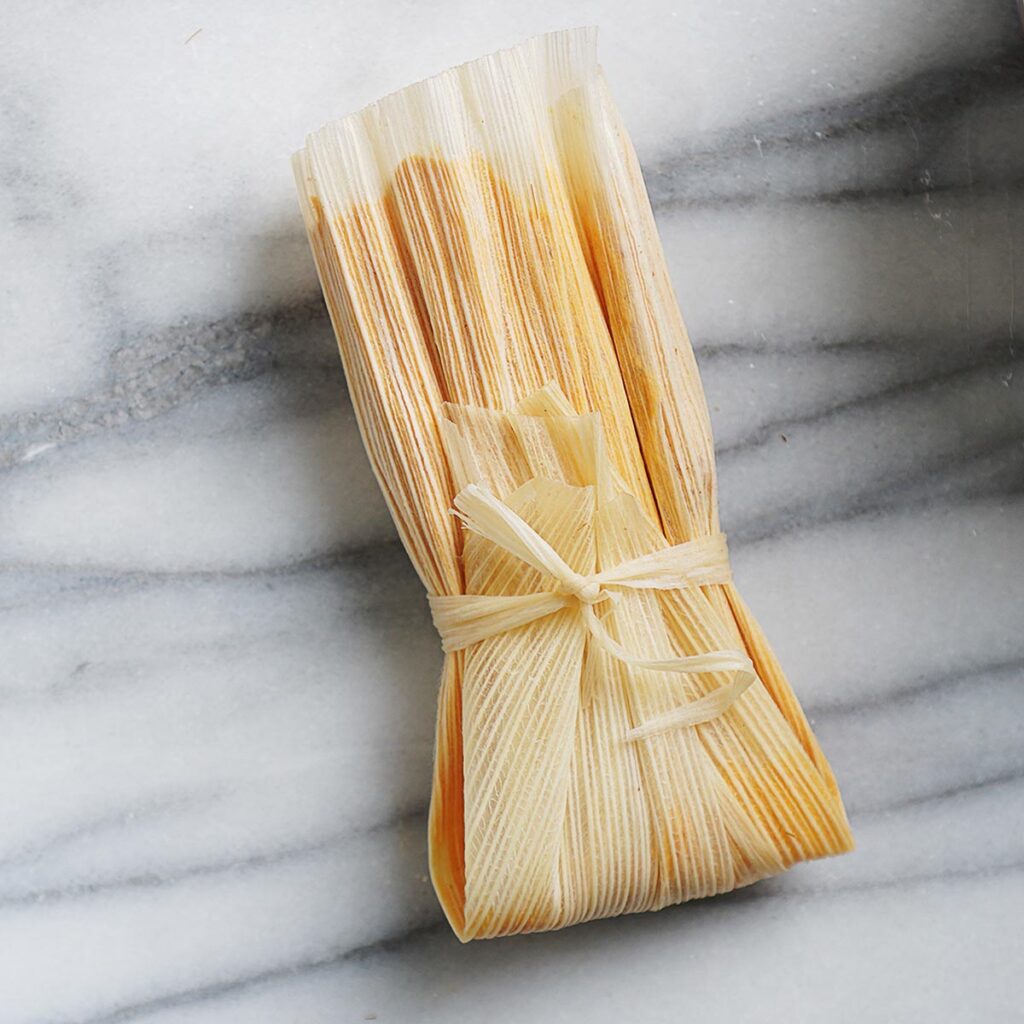
Option 1 -
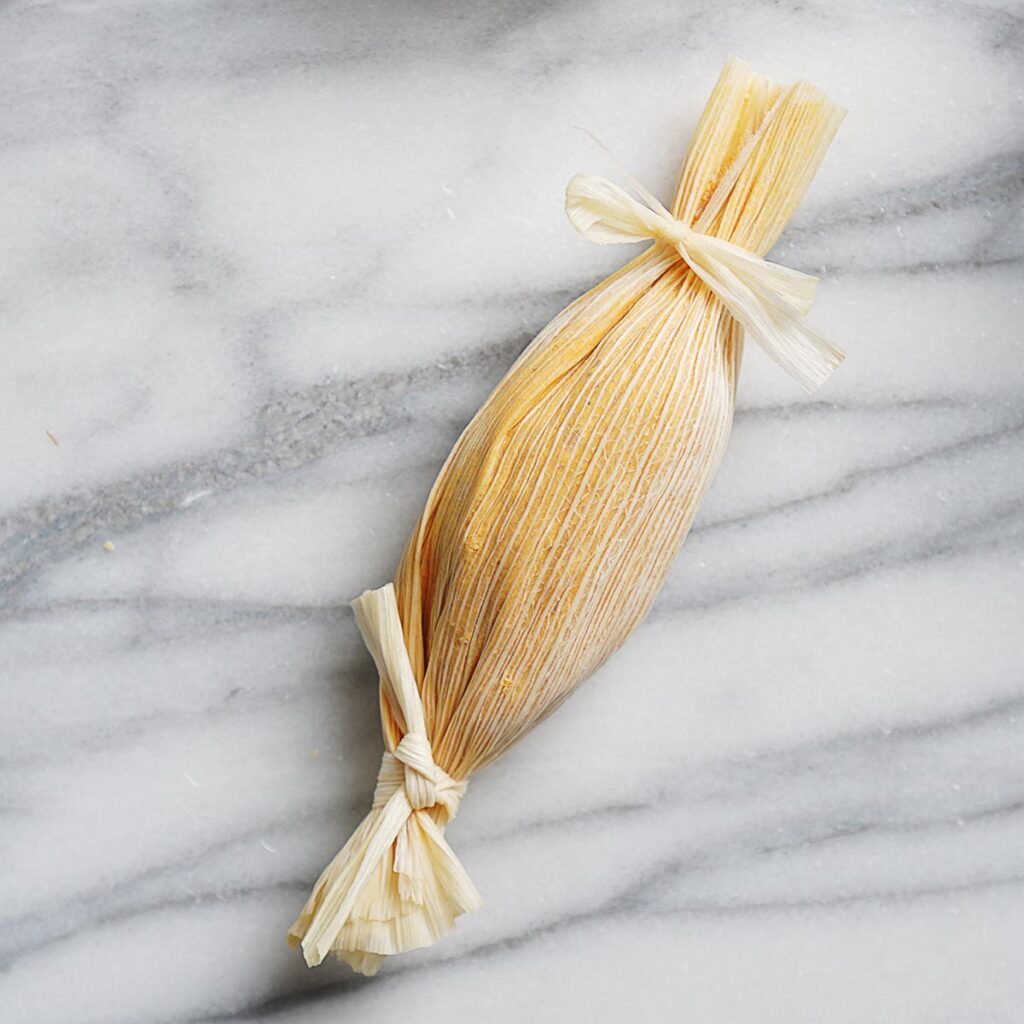
Option 2
Steaming Tamales
Use a large steamer for the tamales pot or a "tamalera" – these are very large pots made specifically for tamales and pozole.
- Add water to the bottom of the steamer making sure it will not overflow into the steaming tray. The tamales should not touch the water.
- Place the tamales standing up and do not over pack the pot since it may affect how they cook.
-
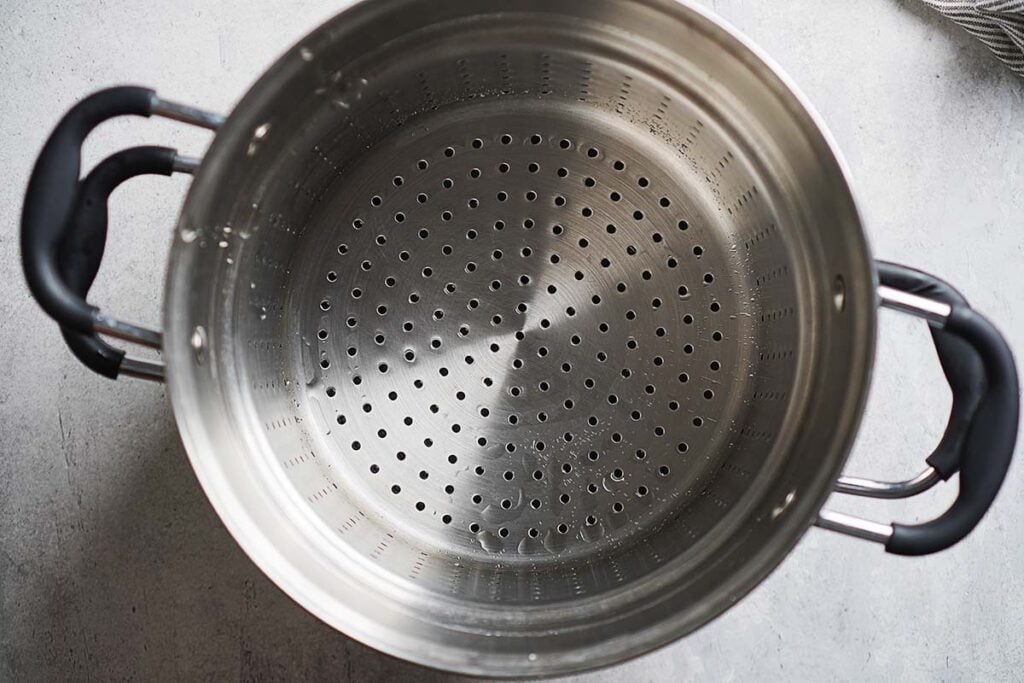
Large steamer to cook tamales -
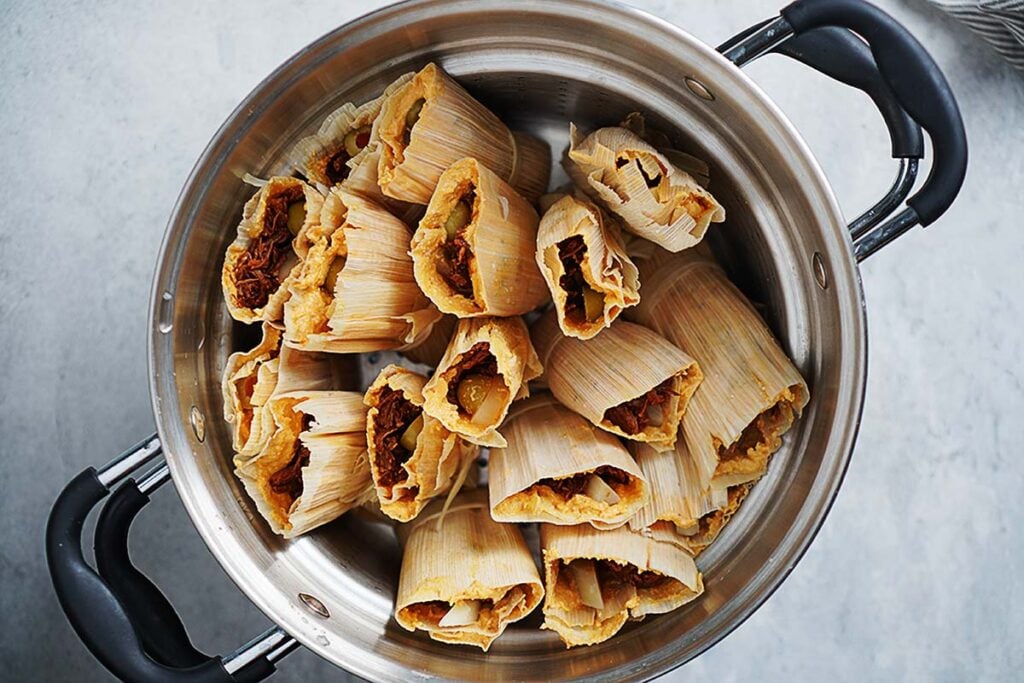
Tip: Don't crowd the tamales in the pot
- Cover and steam on medium heat for one hour.
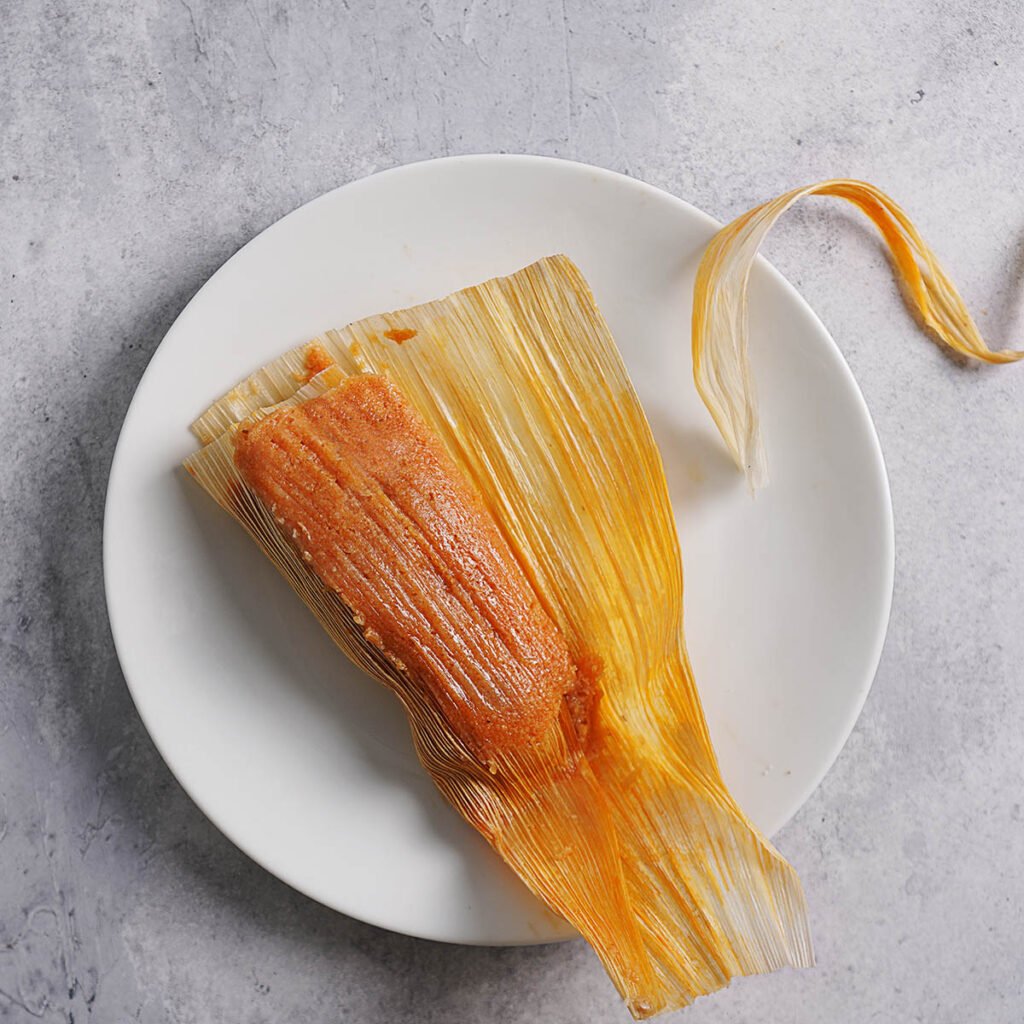
To test whether tamales are done, remove one from the pot and gently unfold one of the sides. The dough should pull away from the husk easily not leaving any wet masa on the husk, and the tamal should hold together.
The texture of a fully cooked tamal is bread like but very fine-grained and moist.
Make Ahead
You can make preparations a few days ahead to save time. This is an important step for success especially if you're a beginner. Things can get wild if you try to cook everything the same day!
- Up to 4 days before: cook the red sauce and keep in refrigerator. It can also be made weeks in advance and freeze!
- The day before: cook the meat, shred and mix with the red sauce. Save the broth where you cook your meat as it will be used for the masa. Side note: leftover broth makes a delicious Mexican Sopa!
- The day before: Slice the olives if using any.
- Make your side dishes!
What to eat with Tamales
Red Tamales pair perfectly with Frijoles Puercos or just regular Refried Beans. For parties or holidays, they are also served with a side of Mexican Macaroni Salad.
They are also a very common breakfast in Mexico served with Atole or Champurrado. My favorite way to eat them for breakfast? Fried until crispy with a side of over medium eggs! The beans and a good Chile De Arbol Salsa are a must.
In some parts of Mexico, they're even eaten in a sandwich, called "guajolota" using a bolillo for the bread. It goes without saying that these are not light in calories lol!
Freezing Tamales
You can freeze tamales cooked or raw. However it's best to freeze cooked tamales as the raw fillings can change flavor and texture when frozen.
- Let the tamales cool completely before freezing.
- Place the tamales in airtight freezer bags or thick aluminum foil and remove as much air as you can. Do not remove the husk as it will help maintain the flavor.
- For extra protection and to conserve the freshness, place the bags in a plastic or glass container.
- Freeze tamales for up to 5 months.
While they will still be fine to eat after this time, the quality and flavor will start to decline and they just won't taste as good as they should.
How to defrost:
It's best to let them thaw overnight in the fridge. This is the safest way to thaw tamales and to ensure they're not left at temperatures that could lead to bacterial growth.
If you don't have time to wait overnight, a few hours in the fridge should defrost the tamales long enough for you to reheat them later. Alternative, you can defrost them in the microwave on the defrost setting.
How to reheat
There are a few ways to reheat tamales and it's all a matter of preference. Which one is yours?
- By frying: Remove the husk and place them on a heavy bottom skillet (no extra oil needed). Fry each side on medium low until they reach the desired crispiness and the center has heated thru. About 5 minutes per side.
- In microwave: Keep the husk on and place in microwave for about 1 to 2 minutes or until center has heated thru.
- In steamer: Fill the steamer with about 2 inches of water along with the steaming tray. Place the tamales standing up (make sure the water doesn't touch the tamales as they will get mushy).
- Set to medium heat, steam for 40 minutes for frozen tamales but start checking after 20 minutes to make sure they're not overcooked.
- For non-frozen tamales, steam for 20 minutes or until the center reaches the desired temperature. Don't cook them too long as they dry up quickly.
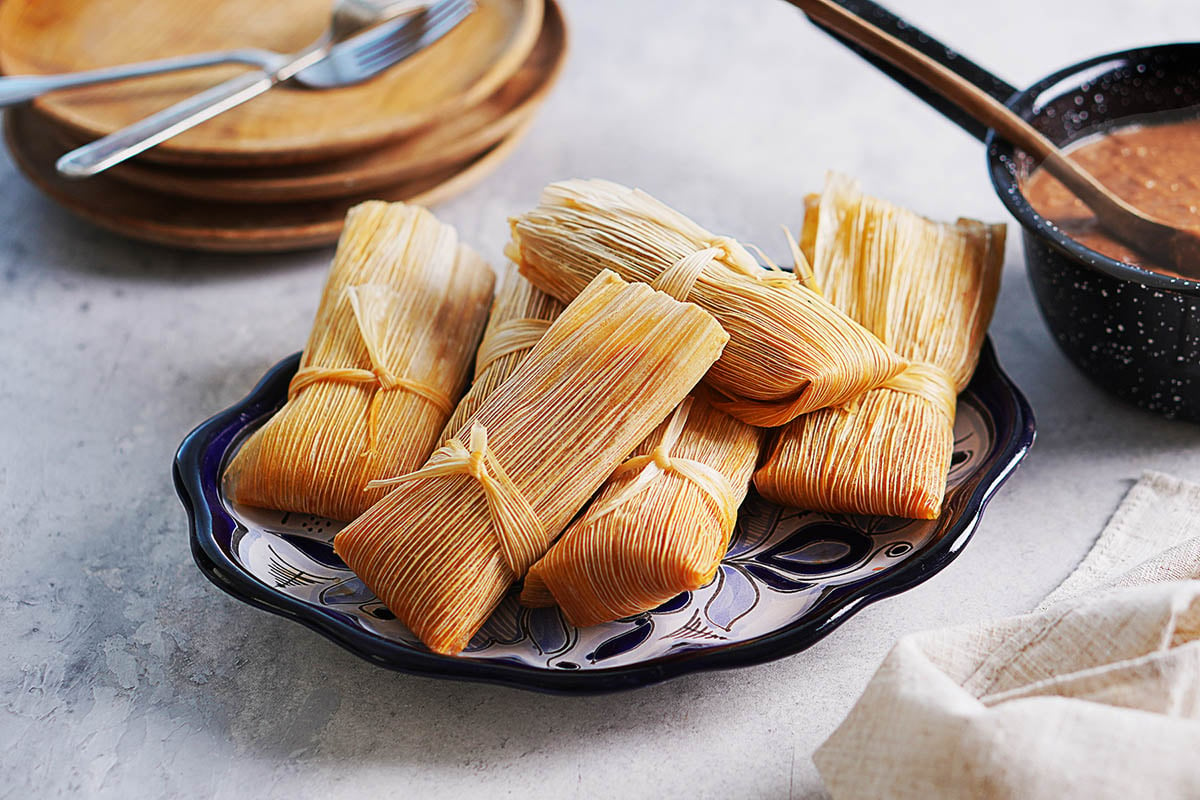
FAQs
How long to cook/steam tamales for?
– Raw tamales should steam for one hour.
– Steam for 40 minutes for frozen tamales but start checking after 20 minutes to make sure they're not overcooked.
How long do tamales last in the fridge?
It's best if eaten within 4 to 5 days for the best flavor. If they won't be used within this time, it's best to freeze them and eat later.
Are tamales gluten free?
They are absolutely gluten free! The masa is naturally gluten free as it's made from corn and all natural ingredients.
So are you making them?
I don't want to be dramatic, but if I had to choose a Last Meal, this Mexican dish may be it (okay, let's include Entomatadas okay? 😀 ) Of all the Tamales in Mexico, these are still the best Red Tamales I've ever had!
If you give these recipe a go, please do tell! Let me know in the comments below how much you loved them!
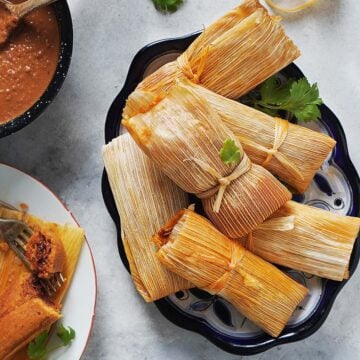
Authentic Red Tamales – Step by Step guide
Learn how to make tamales at home with my step by step instructions and an easy guide. I guarantee to make you an expert with this recipe!
Prevent your screen from going dark
-
Electric mixer or hand mixer.
-
Large steamer pot
Tamales
To Make The Beef (substitute with pork or chicken)
- 2 pounds beef shoulder roast or chuck roast cut in 2 inches squares and most of the fat removed
- 1 onion cut in half
- 3 garlic cloves
- 2 celery sticks
- 1 teaspoon oregano
- salt & pepper to taste
- 2 cups of Red Chile Sauce
To Make The Masa
- ¾ pound vegetable shortening
- 1 tablespoon table salt
- 1 teaspoon baking powder
- 2 ½ punds fresh masa
- ½ cup beef stock
- ½ cup Red Chile Sauce
- 1 bag corn husks
Optional fillings:
- 2 potatoes sliced in long strings par cooked – see notes.
- pitted olives 1 per tamal, cut in half
Make the shredded meat
-
In a large pot add the beef, onion, garlic, oregano, salt & pepper. Cover with enough water to cook the ingredients (about 2 liters).
-
Cook until the meat is fork tender and comes apart with no resistance, about 2 hours. When done, remove the roast to a platter to cool, reserve the beef broth.
-
Hand shred the meat
-
Add the 2 cups of red chile sauce and mix thoroughly. Refrigerate until ready to use.
Soak The Husks
-
Place the corn husks in a large container or bowl and cover with warm water. Place something heavy on top of the husks in order to keep them submerged. Soak for at least 20 minutes to soften them up.
Make The Massa
-
In a mixing cup, add the broth and red sauce and combine.
-
In the bowl of a stand mixer fitted with a paddle attachment, add the shortening, salt, and baking powder.
-
Mix on medium/low power until it's light and fluffy. About 8 to 10 minutes. Scrape down the sides of the bowl with a spatula to mix the ingredients on the sides.
-
Alternate wet and dry ingredients: With the mixer still running, add some of the masa (the size of a tennis ball) and mix. Then add some of the sauce and mix.
-
Repeat until all the masa and sauce are fully incorporated and have a smooth & silky batter.
-
To test when the masa is ready, add a dollop of it in a glass with cold water: if itfloats, then it's ready.
Note: What if the masa doesn't float? Just continue kneading the masa for a few more minutes. This will make it more fluffy and eventually will float.
-
To Assemble The Tamales
-
Get all of your ingredients lined up and ready for assembly.
-
Scoop about a ¼ cup masa into one large or two overlapping smaller husks and smear it with a small spatula or back of a spoon.
-
Add about 2 to 3 tablespoons of shredded meat, 1 potato slice & olives (optional).
-
Fold one side of the husk to enclose then the other side on top of it.
-
Tie the tamales: Fold up the bottom to the top (the narrow end), leaving the top open. Then tie with a string made from the husk.
Steaming Tamales
-
Using a large steamer or a tamalera pot, add water to the bottom of the steamer making sure it will not overflow into the steaming tray. The tamales should not touch the water.
-
Place the tamales standing up and do not over pack the pot since it may affect how they cook.
-
Cover and steam on medium heat for one hour.
-
To test whether tamales are done, remove one from the pot and gently unfold one of the sides. The dough should pull away from the husk easily not leaving any wet masa on the husk, and the tamal should hold together.
-
The texture of a fully cooked tamal is bread like but very fine-grained and moist.
-
Serve hot with beans or your favorite side dish and your favorite salsa.
Here is a recipe on how to make masa for tamales with maseca flour.
To cook the potatoes:
- Slice them thinly then place in small to medium pot.
- Cover with water and cook for about 4 minutes or until they're cooked half way only. They will finish cooking when you steam the tamales.
Freezing Cooked Tamales
- Let the tamales cool completely before freezing.
- Place the tamales in airtight freezer bags or thick aluminum foil and remove as much air as you can. Do not remove the husk as it will help maintain the flavor.
- For extra protection and to conserve the freshness, place the bags in a plastic or glass container.
- Freeze tamales for up to 5 months.
How to defrost:
It's best to let them thaw overnight in the fridge. This is the safest way to thaw tamales and to ensure they're not left at temperatures that could lead to bacterial growth.
If you don't have time to wait overnight, a few hours in the fridge should defrost the tamales long enough for you to reheat them later. Alternative, you can defrost them in the microwave on the defrost setting.
Whenever you come back to this recipe, you'll be able to see your notes.
Serving: 1 Tamal | Sodium: 740 mg | Fiber: 1 g | Potassium: 2 mg | Cholesterol: 28 mg | Calories: 145 kcal | Saturated Fat: 2 g | Fat: 7 g | Protein: 9 g | Carbohydrates: 16 g
The nutritional information and US conversions are calculated automatically. I cannot guarantee the accuracy of this data. If this is important to you, please verify with your favourite nutrition calculator and/or unit conversion tool.
This recipe was originally published in December 2014. Post has been updated to show step by step instructions and to be more helpful.
Rant coming! Did you know there is no "e" at the end of tamal? It's not tamale, it's tamal in Mexico… Is adding an "e" the English translation? I digress!
Source: https://www.muydelish.com/how-to-make-beef-tamales/
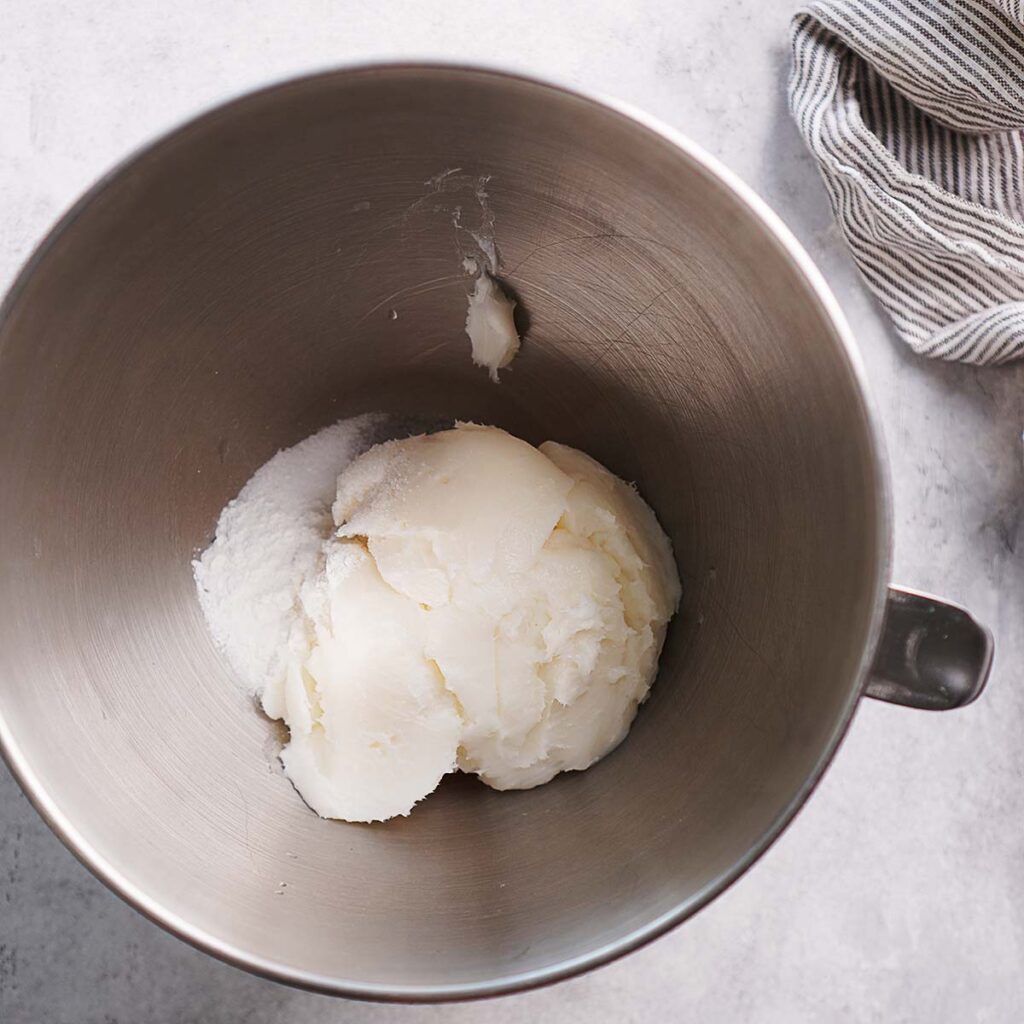
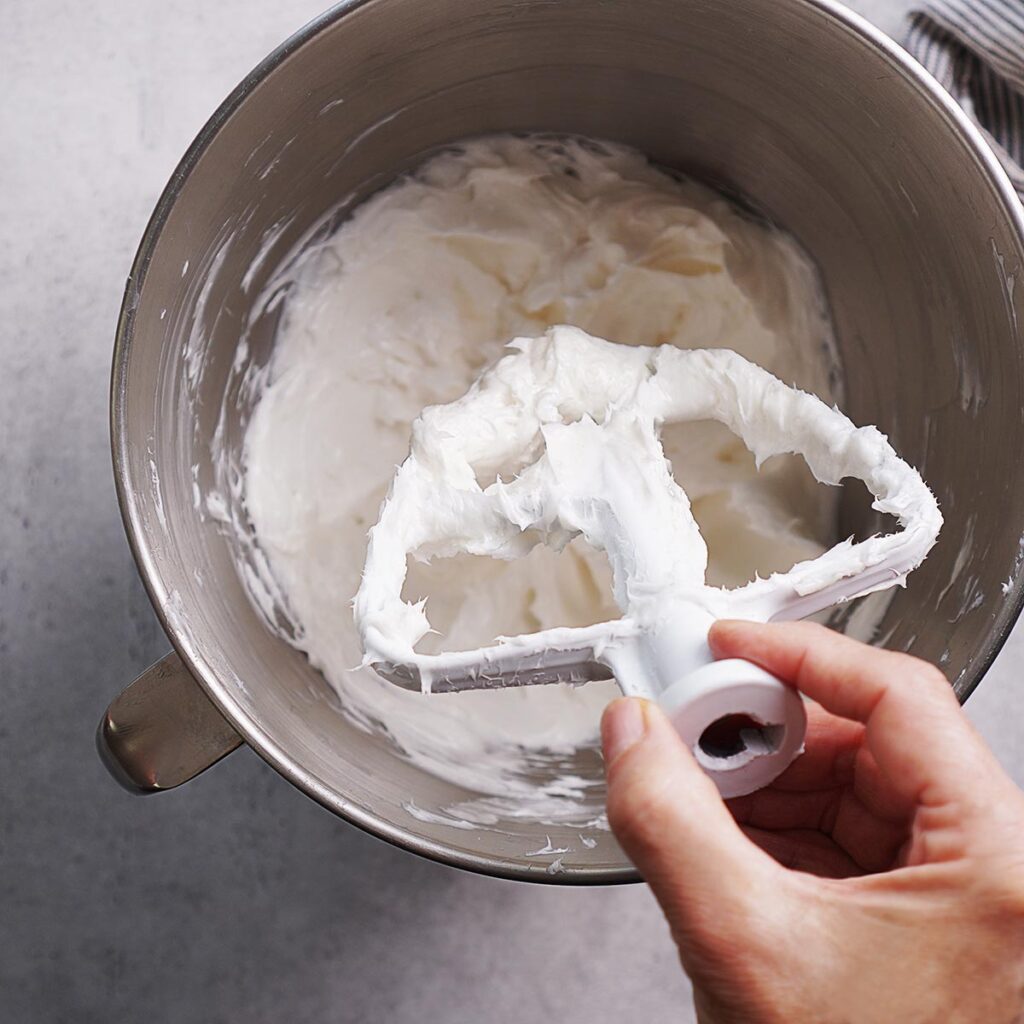
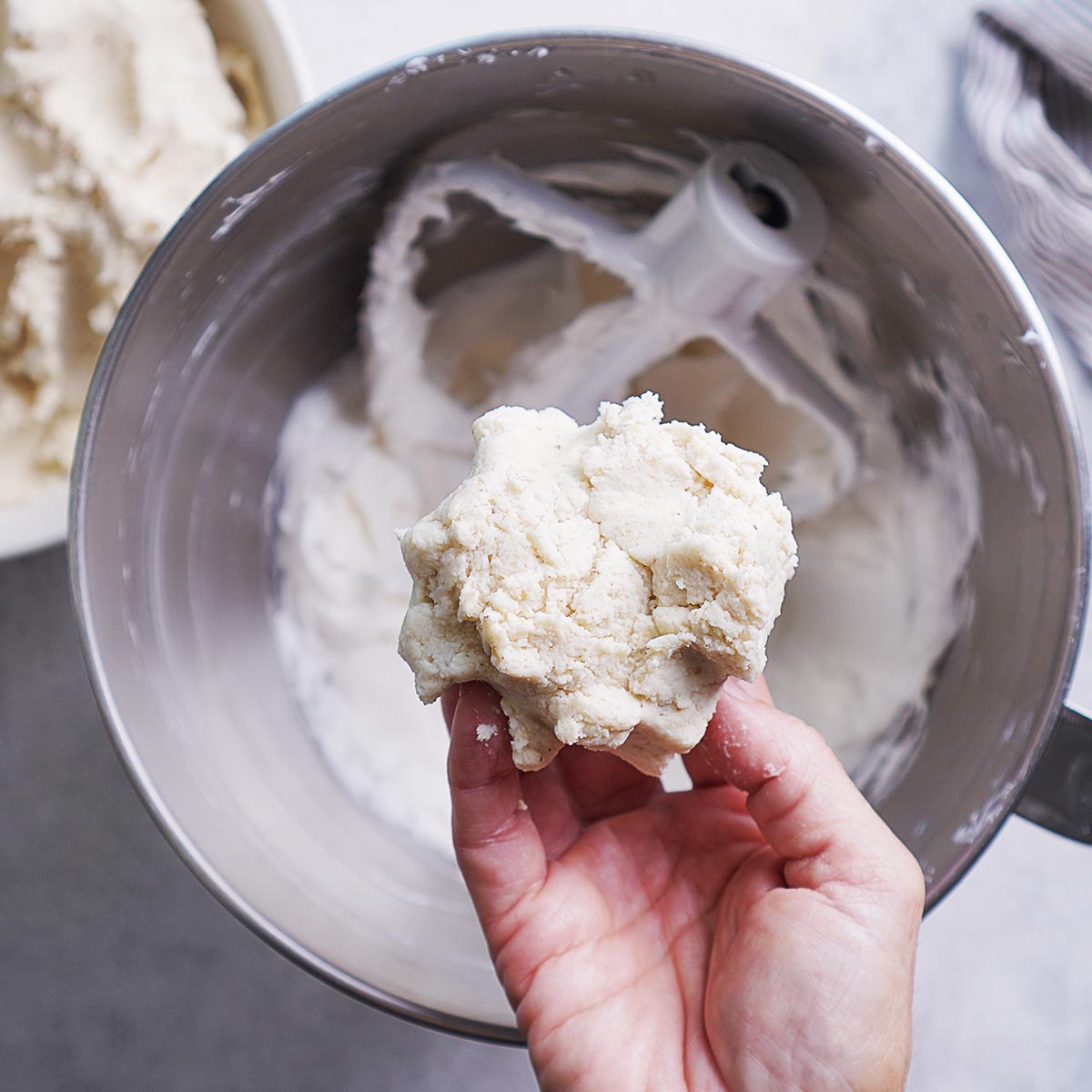
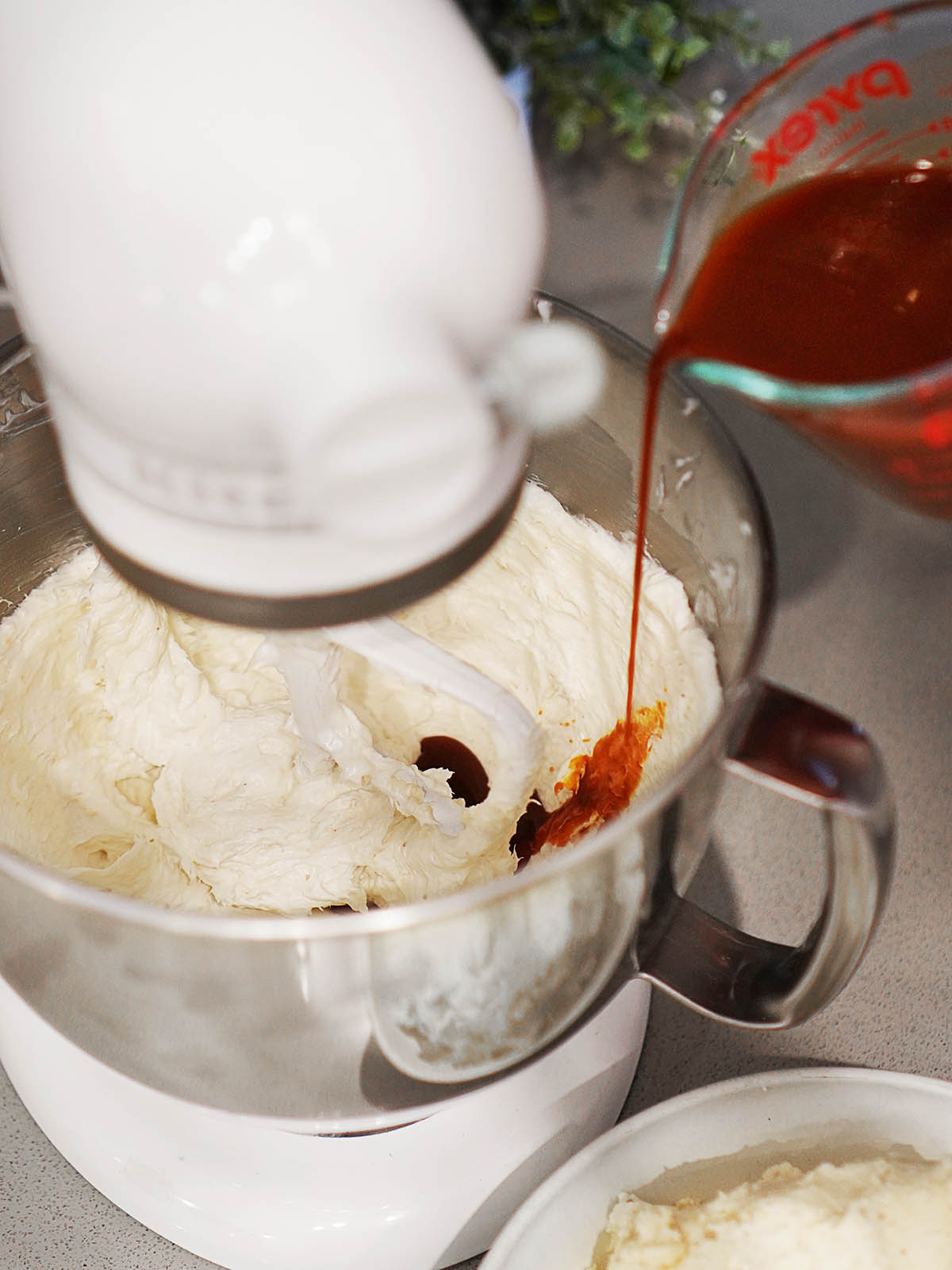
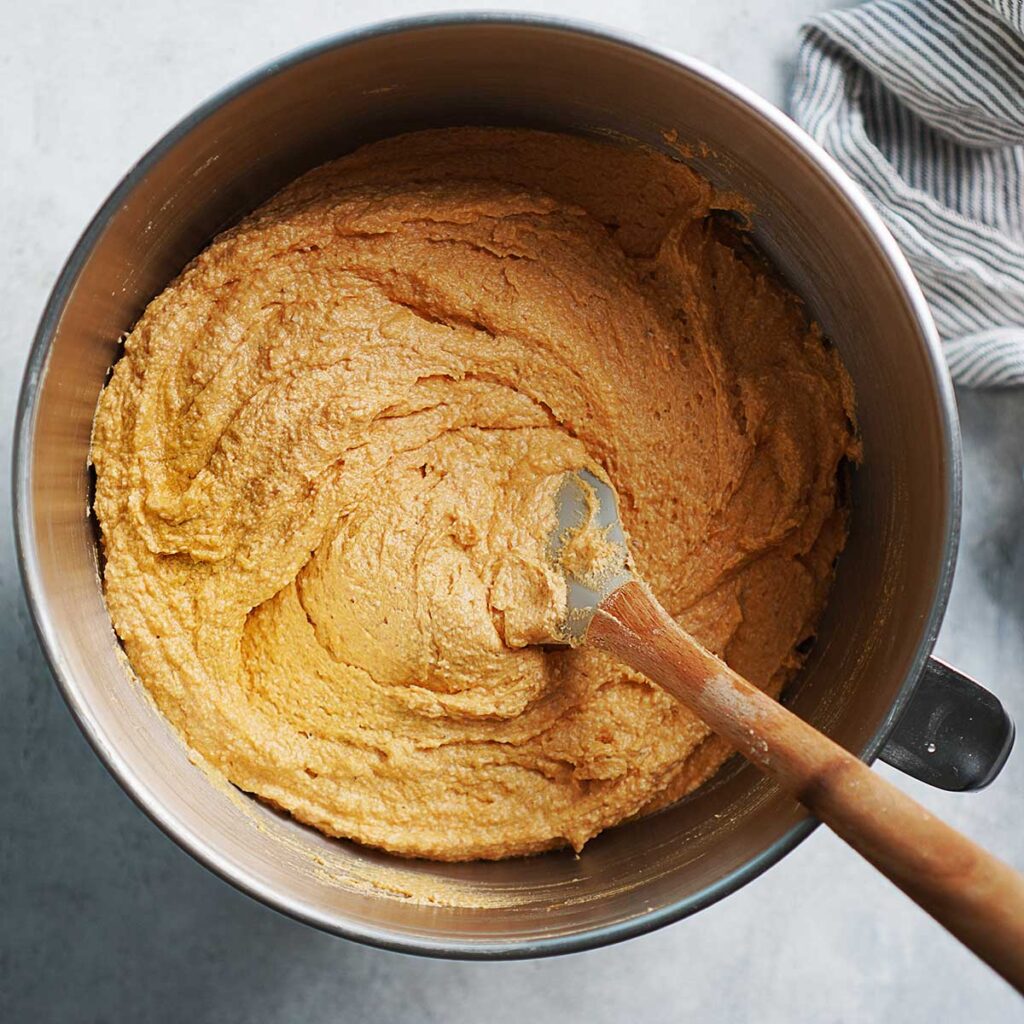
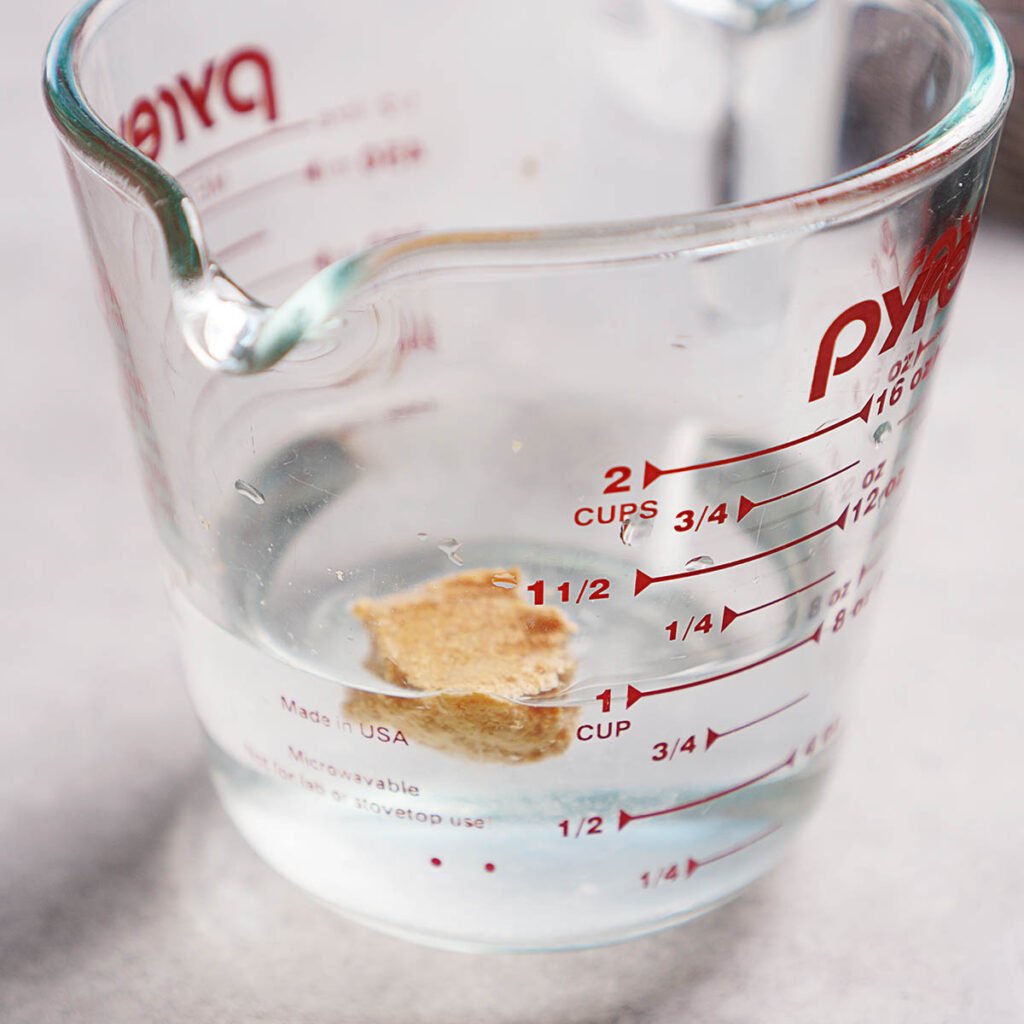
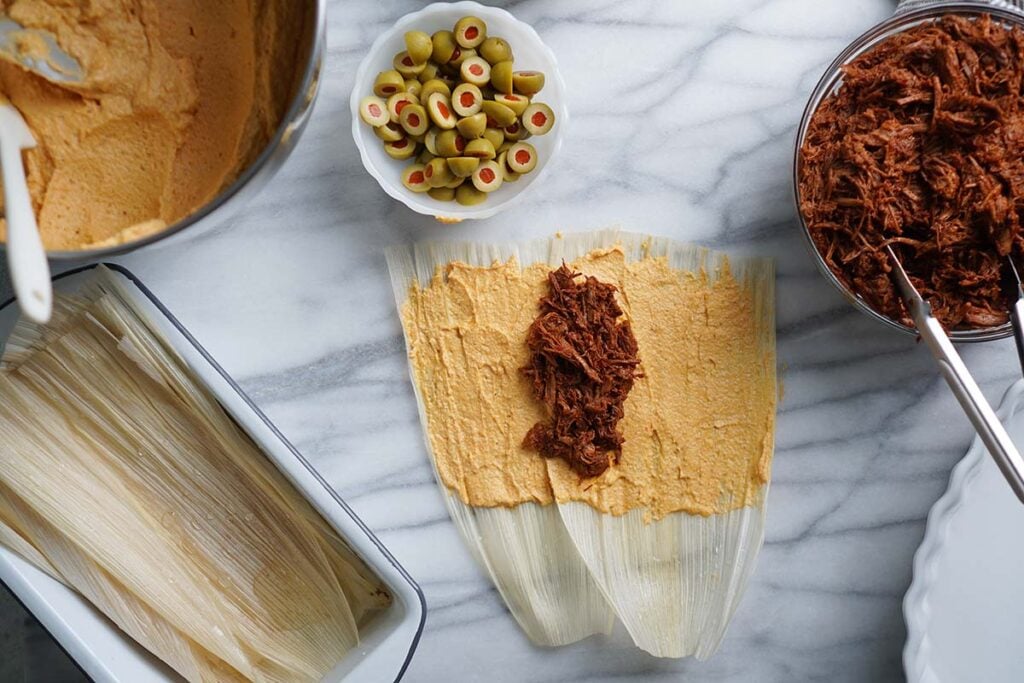
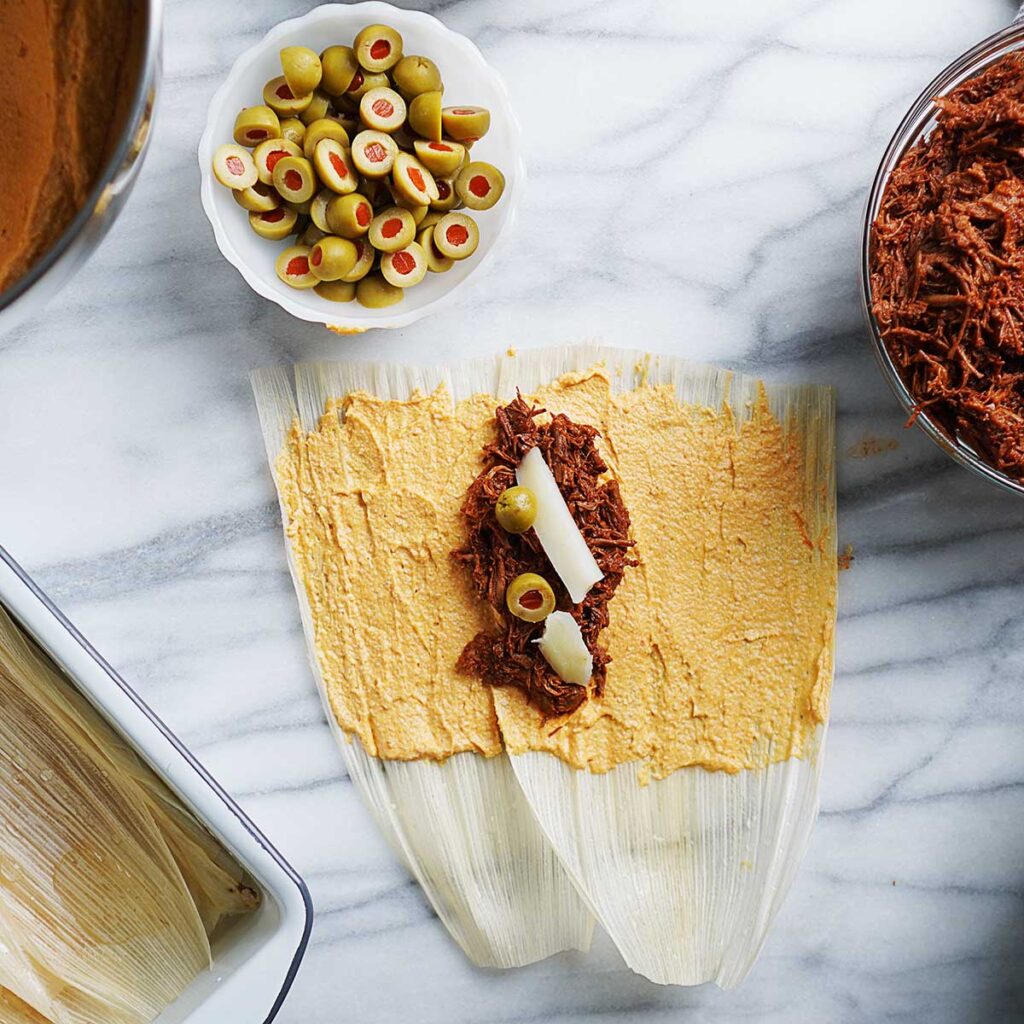
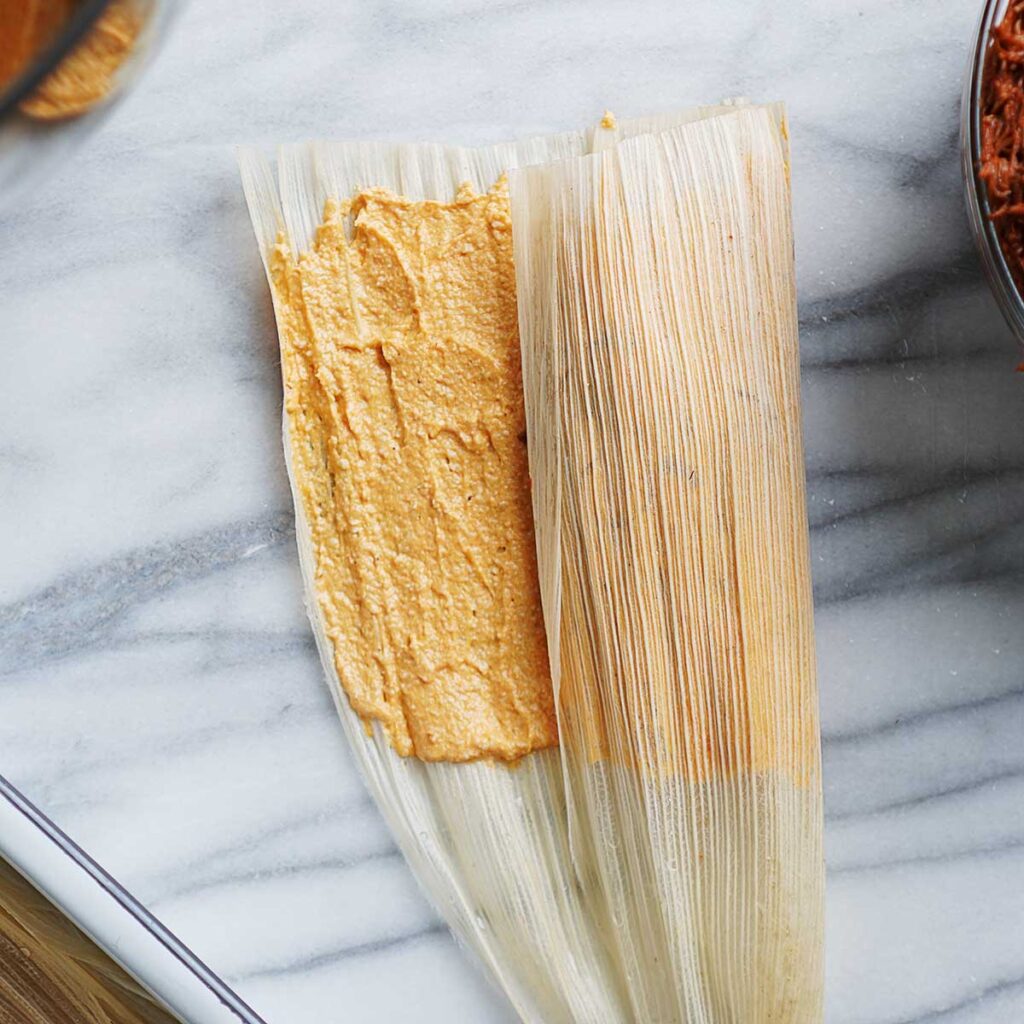
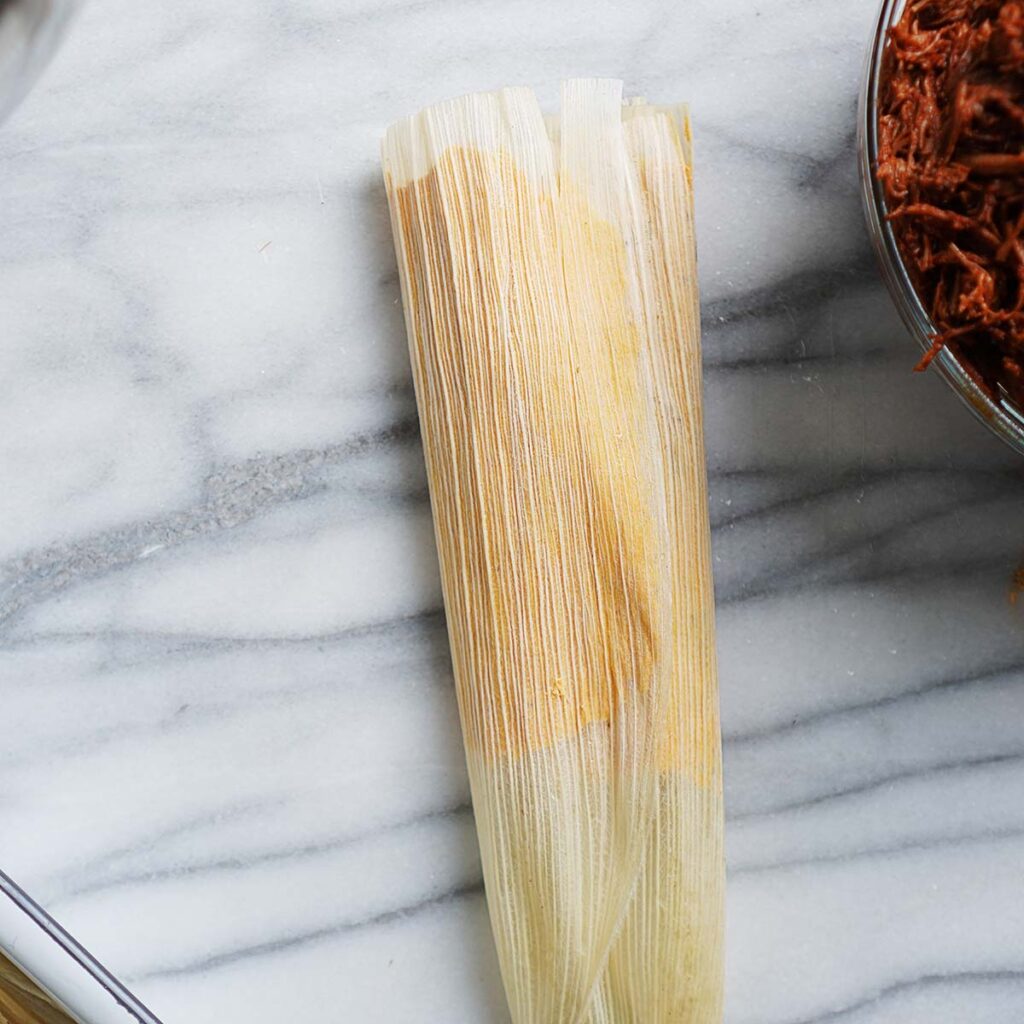
0 Response to "Why Are Most Tamales Made With Pork Instead of Beef"
ارسال یک نظر